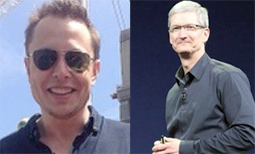PR textbook writers, including esteemed O'Dwyer columnist Fraser Seitel, got some rich material this week for future editions of their college textbooks courtesy of Apple CEO Tim Cook and Tesla Motors boss Elon Musk.
Cook got worldwide media attention for genuflecting to Chinese government-controlled media after they heaped criticism on Apple for its lousy customer service in the People’s Republic.
 In a signed open letter to Chinese consumers, Cook tackled the "perception that Apple is arrogant and doesn't care or attach enough importance to consumer feedback. We express our sincere apologies for any concerns or misunderstandings this gave consumers." [Can Apple’s hard-pressed investors expect a similar missive from Tim? Don’t count on it.]
In a signed open letter to Chinese consumers, Cook tackled the "perception that Apple is arrogant and doesn't care or attach enough importance to consumer feedback. We express our sincere apologies for any concerns or misunderstandings this gave consumers." [Can Apple’s hard-pressed investors expect a similar missive from Tim? Don’t count on it.]
Apple's problem in China is more than perception. It's reality. Despite heady growth from $2.8B sales in fiscal 2010 in China to nearly $23B last year, the company failed to build up a service network to keep customers happy.
The company took a page from its manufacturing (or lack of manufacturing) strategy and farmed out service to vendors. Chaos ensued. Cook said "sorry" and promised to "increase the supervision and training given to Apple’s authorized service providers."
A better idea for a market that trails only the U.S. in importance to Apple: spend some money and staff up in "The Middle Kingdom."
Tesla's Musk is the visionary behind PayPal and SpaceX so when he promised via social media a significant announcement on April 2, Tesla watchers, techies and Wall Street took notice.
On the big day, Musk announced a "revolutionary automotive financing product," in which he is "personally standing behind that guarantee to give customers absolute peace of mind about the value of the asset they are purchasing."
Musk, whose net worth is in the $3B range, gets credit for standing behind his product. Wall Street however said "so what," and drove Tesla shares down more than two percent in after-hours trading.
The "revolutionary" part of the financing package is a deal arranged with Wells Fargo and U.S. Bancorp to structure leases so customers can apply the value of federal/state credits for Tesla’s electric car towards the cost of a down payment.
The Tesla Model S goes for $62,400, while the Performance model goes for $87,400. Is Tesla’s affluent buyer market going to be swayed by a $7K to $15K down payment offer? Not really. Had he helmed an economy car company like Kia Motors, Musk would have been on to something.
At Tesla yesterday, Elon committed the classic PR mistake of over-promising but under-delivering.


 Business leaders will face challenges in the upcoming year, some of which will come as a complete surprise, or beyond anyone's imagination.
Business leaders will face challenges in the upcoming year, some of which will come as a complete surprise, or beyond anyone's imagination. Teneo has hired Philipp Grontzki, who is a 20-year veteran of corporate communications and financial journalism, as a managing director in its strategy and communications group.
Teneo has hired Philipp Grontzki, who is a 20-year veteran of corporate communications and financial journalism, as a managing director in its strategy and communications group. Rowan Benecke, who co-founded Zeno Group and helmed Burson-Marsteller's tech practice, has joined McKinsey & Co as director of communications for North America.
Rowan Benecke, who co-founded Zeno Group and helmed Burson-Marsteller's tech practice, has joined McKinsey & Co as director of communications for North America. BCW has named Golin's Matt Coldagelli EVP and leader of its corporate affairs practice in Chicago.
BCW has named Golin's Matt Coldagelli EVP and leader of its corporate affairs practice in Chicago. Abby Bailey, who headed corporate communications for Fedex in its Middle East, India and Africa region, has joined Teneo as managing director in Dubai.
Abby Bailey, who headed corporate communications for Fedex in its Middle East, India and Africa region, has joined Teneo as managing director in Dubai.


 Have a comment? Send it to
Have a comment? Send it to 
No comments have been submitted for this story yet.